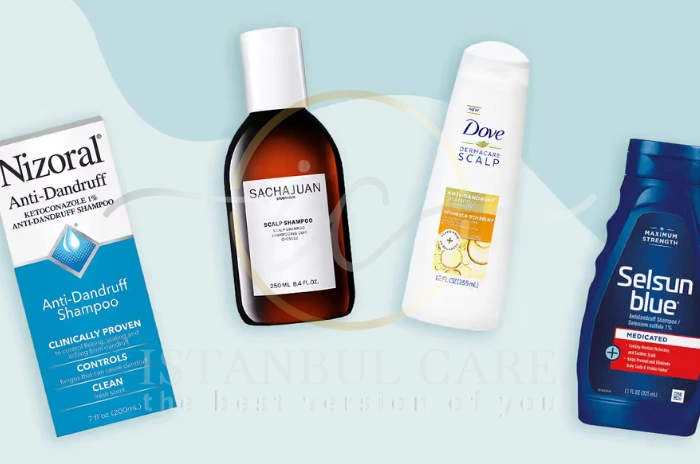Dealing with persistent flakes and an itchy scalp can be frustrating and embarrassing. Dandruff shampoo offers an effective solution for managing this common scalp condition that affects millions of people worldwide. The right anti-dandruff shampoo can provide relief from uncomfortable symptoms while restoring your confidence.
Understanding how to choose and use the best dandruff shampoo for your specific needs is crucial for achieving long-term results. This comprehensive guide will help you navigate the various treatment options, ingredients, and application methods to find your ideal scalp care solution.
What is dandruff and common symptoms
Dandruff is a common scalp condition characterized by the excessive shedding of dead skin cells, creating visible white or yellow flakes. This condition occurs when the scalp's natural renewal process becomes accelerated, causing skin cells to shed faster than normal. The primary culprit behind most dandruff cases is a yeast-like fungus called Malassezia.
The most recognizable symptom of dandruff is the appearance of flakes on your scalp, hair, and shoulders. These flakes can range from small, dry pieces to larger, oily scales depending on your scalp type and the severity of your condition. An itchy flaky scalp is another hallmark symptom that often accompanies the visible flakes.
Many people experience scalp irritation and redness, particularly in areas where flakes are most concentrated. The itching sensation can be mild to severe and may worsen when you scratch, potentially leading to further irritation. Oily scalp dandruff presents as larger, yellowish flakes that stick to the hair, while dry scalp dandruff typically appears as smaller, white flakes.
How to treat dandruff with anti dandruff shampoo
The foundation of effective dandruff treatment lies in using a specialized anti-dandruff shampoo that targets the root causes of the condition. These medicated shampoos contain active ingredients designed to reduce fungal growth, normalize cell turnover, and soothe scalp irritation.
Zinc pyrithione shampoo is one of the most widely used and effective treatments for mild to moderate dandruff. This ingredient works by inhibiting the growth of Malassezia fungus while reducing inflammation and flaking. It's particularly effective for those with oily scalp dandruff and is gentle enough for regular use.
For more persistent cases, ketoconazole shampoo provides stronger antifungal action. This prescription-strength ingredient is highly effective against stubborn dandruff and seborrheic dermatitis. Selenium sulphide shampoo offers another potent option for treating moderate to severe dandruff by slowing down cell turnover while providing antifungal benefits.
How to Find the Best Dandruff Shampoo for Your Needs
Selecting the best dandruff shampoo requires careful consideration of your scalp type, severity of symptoms, and hair texture. Understanding these factors will help you choose a product that addresses your specific concerns while being compatible with your hair care routine.
First, identify whether you have an oily or dry scalp condition. Those with oily scalp dandruff should look for shampoos containing zinc pyrithione or selenium sulfide. If you have shampoo for dry scalp needs, gentler formulations with moisturizing ingredients work best.
Hair texture plays a crucial role in product selection. Curly hair dandruff shampoo should be sulfate-free and contain moisturizing ingredients. Textured hair dandruff care requires products that cleanse effectively without stripping natural oils essential for hair health.
Consider the severity of your condition when choosing between drugstore dandruff shampoo and medical grade dandruff shampoo options. Mild cases often respond well to over-the-counter products, while persistent symptoms may require prescription-strength formulations.
Top Recommendations for Effective Anti-Dandruff Shampoo
| Product Name | Active Ingredient | Best For | Price Range | Frequency |
|---|---|---|---|---|
| Head & Shoulders Classic | Zinc Pyrithione | Mild-moderate dandruff | $ | Daily use |
| Nizoral Anti-Dandruff | Ketoconazole | Severe dandruff | $$ | 2x weekly |
| Selsun Blue Maximum | Selenium Sulfide | Stubborn flakes | $$ | 2-3x weekly |
| Neutrogena T/Gel | Coal Tar | Psoriasis/seborrheic dermatitis | $$ | 2x weekly |
| Jason Tea Tree | Tea Tree Oil | Sensitive scalp | $ | Daily use |
Dandruff shampoo for men often requires stronger formulations due to higher oil production. Products containing zinc pyrithione or ketoconazole typically work well for male users, providing effective flake control and scalp comfort.
Nizoral Anti-Dandruff Shampoo contains ketoconazole and stands out as one of the most effective over-the-counter treatments for persistent dandruff. This ketoconazole shampoo provides prescription-strength antifungal action and is particularly effective for seborrheic dermatitis.
For those seeking natural alternatives, tea tree oil shampoo combines botanical benefits with antifungal properties. This gentler option works well for sensitive scalps while providing effective anti-inflammatory benefits.
Understanding the Key Ingredients in Dandruff Shampoos
Zinc pyrithione shampoo remains the gold standard for dandruff treatment due to its dual antifungal and antibacterial properties. This ingredient effectively reduces Malassezia growth while being gentle enough for regular use. It works particularly well for maintaining scalp health once dandruff is under control.
Salicylic acid shampoo functions as a scalp exfoliating shampoo by removing dead skin cells and reducing flaking. This beta hydroxy acid penetrates the scalp to dissolve buildup while promoting healthy cell turnover. It's especially beneficial for those with thick, stubborn flakes.
Coal tar shampoo provides powerful anti-inflammatory and antifungal benefits for severe scalp conditions. This ingredient slows down excessive cell production while reducing inflammation and itching. It's particularly effective as a scalp psoriasis shampoo and seborrheic dermatitis shampoo.
Ketoconazole offers prescription-strength antifungal action that penetrates deeply into hair follicles. This ingredient is highly effective against resistant fungal infections and provides longer-lasting results than milder alternatives.
Selenium sulfide works by slowing down skin cell production while providing antifungal benefits. This ingredient is particularly effective for oily scalp dandruff and seborrheic dermatitis, though it can cause temporary hair discoloration.
How to use dandruff shampoo for best results
Proper application technique is crucial for maximizing the effectiveness of any anti-dandruff shampoo. Start by thoroughly wetting your hair and scalp with warm water to open pores and prepare the scalp for treatment. Apply a generous amount of shampoo directly to the scalp, focusing on areas with the most flaking.
Massage the shampoo gently into your scalp using your fingertips for at least 30 seconds. The massaging action helps distribute the active ingredients while promoting circulation. Allow the dandruff shampoo to remain on your scalp for the time specified on the product label, typically 3-5 minutes.
Rinse thoroughly with lukewarm water to remove all shampoo residue. Follow with a gentle conditioner applied only to the hair lengths, avoiding the scalp area to prevent interference with treatment.
Frequency of use varies depending on the product strength and your scalp's needs. Most anti-dandruff shampoos work best when used 2-3 times per week initially, then reduced to once or twice weekly for maintenance.
Consistency is key to successful dandruff management. Continue using your chosen best dandruff shampoo even after symptoms improve to prevent recurrence. If one product stops working effectively after several months, consider rotating between different active ingredients.
We’re ready to answer your questions
Dandruff involves fungal overgrowth and inflammation producing larger, oilier flakes, while dry scalp simply lacks moisture and creates smaller, white flakes without underlying infection.
Zinc pyrithione shampoo, ketoconazole, selenium sulfide, and salicylic acid shampoo are the most clinically proven ingredients for treating dandruff and related scalp conditions.
Most anti-dandruff shampoos should be used 2-3 times weekly initially, then 1-2 times weekly for maintenance, depending on symptom severity and product strength.
Consult a dermatologist if over-the-counter dandruff shampoo doesn't improve symptoms after 4-6 weeks, or if you experience severe itching, redness, or hair loss.RetryClaude can make mistakes. Please double-check responses.
Follow us on social media for updates, tips, and patient success stories:

